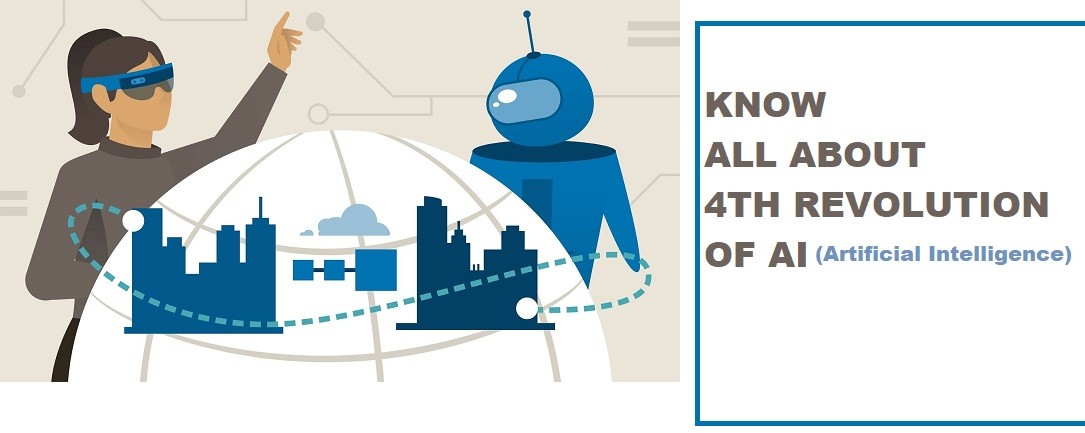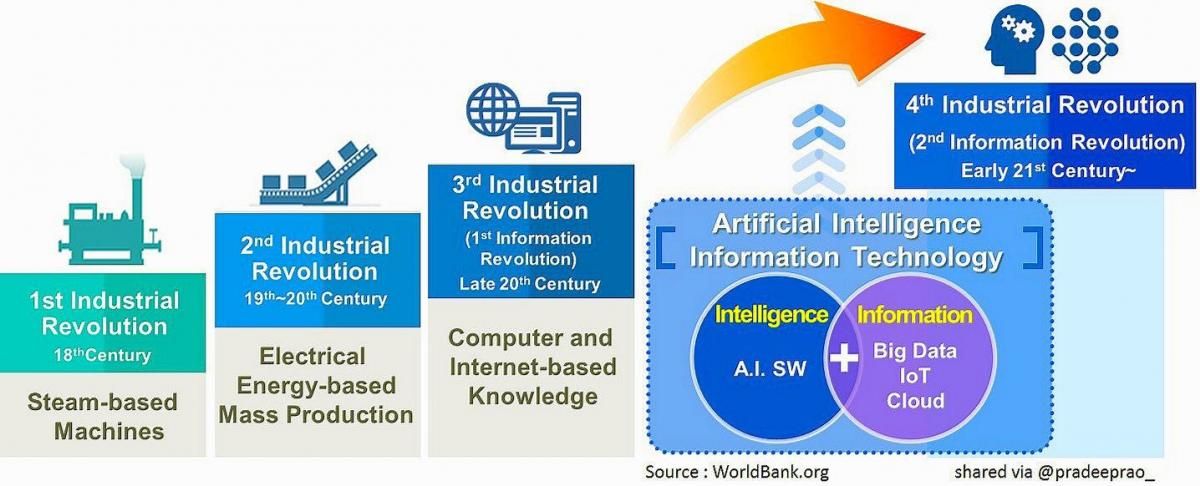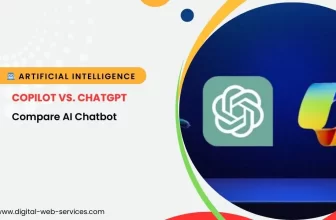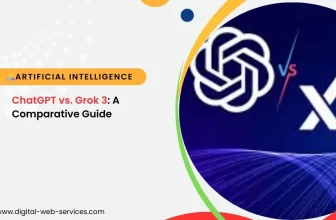
The human being, since ancient times, has yearned to endow his intellectual capabilities with the technology created by himself. There are myths, legends, and stories in which protagonists provide intelligence to their created beings, as in Frankenstein (written in the 19th century) and even Rene Descartes himself wondered if machines could come to think.
The emergence of Artificial Intelligence and the technological advances have a profound impact on our lives and it is undeniable to say that the incorporation of this science into our daily lives is making us participate in an enormous change that is one of the greatest technological revolutions in our history.
The Fourth Revolution!
The evolution of technology has had an impact on the development of AI systems. The Internet and the digital age have redefined the industry and have created jobs that didn’t exist before, say, application developers, social media administrator, YouTubers, etc.
Manufacturing methods are constantly evolving and humans continue to adapt and evolve. On the brink of another revolution, the advances in AI will evolve creating jobs that haven’t been unknown until now.

That is, machines are not going to replace people, people who work with AI will replace people who work without it. Job opportunities related to robotics, programming, and machine communication and supervision will increase.
“Leveraging data is a key factor when making decisions that improve processes, increase productivity, and avoid having people dedicated to performing repetitive tasks, freeing them to create new and better tools in companies.”
Artificial Intelligence has aroused great interest since 2006 and already plays a significant role in our daily life. Machine Learning, Deep Learning, and other subsets of AI have brought with them revolutionary advances in the technology, such as voice or image recognition and natural language processing, automated bots, and many more.
Currently, many sectors are very interested in AI and are seeking to accelerate the new industrial revolution.
The center of AI is shifting from consumer applications to industrial applications. Industrial AI will lay the foundations for digital transformation and business innovation to open the way to a new phase of growth and advancement in both theories and technologies.
AI systems are applied at various levels in different areas, on the one hand, they study us and offer suggestions according to the user preferences, in the field of entertainment such as: Instagram, Spotify, and Facebook.
On the other hand, in more scientific areas, it is used for example to direct rockets on their landing or to detect diseases in the area of medicine, among others.
Fourth Industrial Revolution can be characterized by a few guiding principles some of them being:
-Instantaneity
Monitoring and analysis of data in real-time, ensuring assertiveness in decision making. Know all the stages of the process and the moment in which they occur.
-Virtualization
Remote and virtual monitoring of production processes in order to avoid possible failures and make the production network more efficient and predictable.
-Decentralization in Decision Making
In order to improve the production in the industry, cyber-physical systems make decisions based on data analysis, without depending on external action, making the decision safer and more precise.
-Modularization
In this concept, the system is divided into modules, that is, into different parts. Therefore, a machine will produce according to demand, since it will only use the resources necessary to carry out each task, which guarantees the optimization of production and energy savings.
The main pillars and technological developments that support the so-called Fourth Industrial Revolution, precede the technological developments inherited from the Third Industrial Revolution, but when applied systematically in the context of an information and knowledge society, they have the ability to significantly transform the industry.
Although its scope is not limited only to the industrial or business context, as it impacts many other social aspects and everyday life, constituting a human revolution from the digitization of information.
These pillars are:
#Artificial Intelligence

Artificial Intelligence is a branch of computer science in charge of studying computational models capable of carrying out human activities based on two of its primary characteristics:
- Reasoning
- Behavior
Artificial Intelligence enables system control, automatic process planning, the ability to respond to consumer inquiries and diagnosis, handwritten recognition, speech recognition, pattern recognition, face recognition, statistically-based estimates, natural event predictions, clinical diagnostics, analysis of biological behaviors, among many others.
There is an enormous potential of how to look for things that are done on a day-to-day basis or to solve very large social problems and even at the level of humanity.
#Secure Blockchain
It refers to a data structure in which the information contained is grouped into sets to which meta-information is added relative to another block of the previous chain in a timeline.
Thanks to blockchain-based solutions and cryptographic techniques, the information contained in a block can only be edited by modifying all subsequent blocks, progressively creating a security system so reliable that it is practically impossible to copy or reproduce it, allowing its use as a substitute for the banking system.
Through a decentralized model of exchange of values and in other fields such as the management of medical records in health, the registration of people and certain processes of industrial production.
#Data Science and Big Data
It refers to the data set, large and complex, that requires non-traditional data processing computer applications to handle it properly.
In the context of the information society, the modern use of the term Big Data refers to the analysis of user behavior, extracting value from stored data, and formulating predictions through the observed patterns.
The discipline known as Data Science, specializes in the analysis, processing, treatment and distribution of results, from massive data clusters.
#Internet of Things
Referring to the interconnection between the network of physical objects, environments, vehicles, and machines through electronic devices that allows the collection and exchange of information, especially in the fields of health, education, culture, and industry.

The Internet of Things is nothing more than the ability for electronic devices of daily use and different types to be connected to the Internet for the benefit of one or more users, without requiring regular human intervention for said connection and/or permanent.
#Cloud Computing
Cloud computing refers to the use of software, applications, services and data shared between different locations and systems hosted remotely which allows the remote flow of information and processing capacity, significantly reducing costs, time, and efficiency.
Cloud computing ends up being a change in the traditional computing paradigm, since access to information and technological infrastructure is practically ubiquitous, allowing any computing process to be managed without the technological infrastructure on-site and from anywhere in the world.
#Augmented Reality
It refers to the set of technologies that allow a user to visualize a part of reality through a technological device with added graphic information. The device, or set of devices, adds virtual information to existing physical information, that is, a virtual part appears in reality.
In this way, tangible physical elements are combined with virtual elements, thus, creating an augmented reality in real-time, taking the customer experience to the next level.
#Nanotechnology
Referred to as manipulation of matter at the nanometer scale, for the manufacture of microscale products with at least one size dimension of between 1 to 100 nanometers. Nanotechnology defined by size is naturally a very wide field, which includes different disciplines of science as diverse as surface science, molecular biology, organic chemistry, to name a few.
Research and associated applications are equally diverse, ranging from extensions of device physics to new approaches based on molecular self-assembly.
#Autonomous Robotics
Although robotics is a native technology of the Third Industrial Revolution, it is in Industry 4.0 that it requires skills beyond its predecessors, managing to incorporate capabilities to work without a human supervisor and in turn automate other robots so that they are also automatic, just like they lead the coordination of a series of logistics and production tasks, increasing production volume and reducing costs.
The Last Say
Industrial Artificial Intelligence will lay the foundation for a digital transformation and business innovation never seen before. By changing the way of working, AI allows companies to make the best possible use of their practical experience, even to the point of displacing traditional work and becoming the productive factor itself.
Technological transformation has long arrived in what is already known as the Fourth Industrial Revolution AI. The development of advanced technologies such as Artificial Intelligence extended its application in sectors such as robotics and computing to integrate into such daily actions as searching for information through Siri or Google Assistant.
Digital Web Services (DWS) is a leading IT company specializing in Software Development, Web Application Development, Website Designing, and Digital Marketing. Here are providing all kinds of services and solutions for the digital transformation of any business and website.










